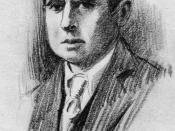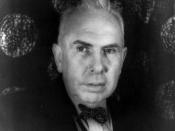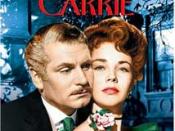The Effects of Society on Carrie Meeber In Theodore Dreiser's Sister Carrie, Carrie Meeber is depicted as a poor helpless young woman living in a predominately male society. Dreiser reveals Carrie as a "bright, timid girl full of the illusions of ignorance and youth"ÃÂ (Dreiser 1). She wants pleasure and social position and yet she is confused as to what these things might be. Carrie believes the city will bring promise of a better life financially. She is young and inexperienced in the world of men, and therefore is not wise enough to understand the actions of the man, known as Drouet, that she meets on the train. In relationship to society, the character of Carrie is similar to a chess pawn. Carrie seems to drift through various social positions at the expense of others. Society itself places different propelling situations at Carrie's feet. Her gender, environment, and the people who surround her determine Carrie's fate.
Carrie leaves her small town home in hopes of creating a better life for herself. However, Dreiser states that Carrie is a "half-equipped little knight"à(2) venturing out into the world. She has small town virtues and has no idea of the effect that the city will have on her life. She is oblivious to the fact that city life is harsh and everyone there is searching for the same thing"æfame and fortune. Dreiser says it best when he states that when a young girl leaves home, someone will either save her and she will become "better"ÃÂ, or she will fall into the "cosmopolitan virtues"àand become worse (1). One can conclude early in the novel that Carrie will be forced down the path of vices, or "cosmopolitan virtues"àby her longing and desire for "the good life"ÃÂ.
Carrie's first object of deception is introduced before she even arrives in the city. This object is a well dressed, wealthy man named Drouet, who will become the first step in Carrie's ladder to success. Carrie determines by Drouet's clothing that he possesses the wonderful life that she longs for. Drouet provides Carrie with clothing and other material items that allow her to obtain a higher social status. From her relationship with Drouet, Carrie manages to gain the experience and social skills to pursue higher aspirations. When Drouet seems to have nothing left to offer Carrie, she discovers Hurstwood has many favorable characteristics that Drouet lacks. He has a more acute sense of culture and worldliness, along with the wealth needed to explore the new wonders of the city. Carrie then leaves Drouet after the realization that Hurstwood can provide more of a chance for success. Once in New York, Hurstwood's wealth and stamina begin to decline. He is not able to find or keep a job. With no one left to support her, Carrie gets a job. As Carrie's theater career rises and her social status improves, Hurstwood becomes completely dependent on her. He is no longer the intelligent, assured, and cultural man that she thought he was. With the ability to support herself,Carrie leaves Hurstwood. He becomes a beggar and ends up killing himself. Carrie used both Drouet and Hurstwood to obtain her success, and after becoming wealthy she views herself as too good for men.
Throughout the novel, Carrie struggles to obtain the success that she longs for. She always thought that if she ever got the wealth and position, which she now has, that she would be completely happy. However, her wealth does not give her the happiness and satisfaction that she thought it would. A friend introduces her to Bob Ames, unlike any man that she met before. Ames notices that Carrie is sad. Ames offers her some words of wisdom saying, " Your happiness is within yourself wholly if you will only believe it"ÃÂ (Dreiser 385). Here was a man not offering her money, clothes, or applause, all the things that Drouet and Hurstwood had given her. It took a little thought, but finally Carrie realized that he secret to her happiness was to give off herself to those less fortunate. She finally begins to understand the true meaning of happiness and how to achieve it. With age and experience, Carrie comes to realize that contentment comes from giving to those less fortunate than herself, and that character is more important that how a person looks. Wealth can only buy material things. Happiness must come from within.
Carrie has many successes and failures throughout the novel. However, overall her failures outweigh her successes. From the beginning Carrie sets out to obtain wealth and position because she thinks that these things will provide her with happiness. However, once she obtains the wealth and position she comes to understand that money can only get someone so far. When she becomes a famous and popular New York actress she still does not possess what she desires. She is alone among many friends and admirers. At the end of the novel as Carrie sits in her rocking chair surrounded by her beautiful gowns and expensive furniture, she is forced into the realization that money can not buy happiness.
Works Cited Dreiser, Theodore. Sister Carrie. New York: Bantam Books, 1982.


